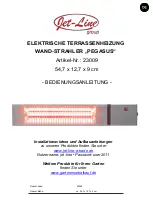
24
www. statewaterheaters.com
100304509_2000545232_Rev. 01
VENTING
Plan the vent system layout so that proper clearances are
maintained from plumbing and wiring. Vent pipes serving
power vented appliances are classified by building codes as
“vent connectors”. Required clearances from combustible
materials must be provided in accordance with information
in this manual under "Locating The New Water Heater"
and with the latest edition of
“National Fuel Gas Code”,
ANSI Z223.1/NFPA 54
and local codes.
This unit includes an air intake terminal
and an exhaust vent terminal.
Improper Installation, use and service may result
in property damage.
CAUTION
Breathing carbon monoxide can cause brain damage or death.
Always read and understand instruction manual.
•
Install vent system In accordance with codes.
•
Do not operate water heater if flood damaged.
•
Install water heater in accordance with the
instruction manual.
•
Do not operate if soot buildup is present.
•
Do not obstruct water heater air intake(s) with
insulating blanket.
•
Do not place chemical vapor emitting products near
water heater.
•
Gas and carbon monoxide detectors are available.
•
Never operate the heater unless it is vented to the
outdoors and has adequate air supply to avoid risks
of improper operation, fire, explosion or asphyxia-
tion.
•
Analyze the entire vent system to make sure that
condensate will not become trapped in a section of
vent pipe and therefore reduce the open cross
sectional area of the vent.
Breathing Hazard - Carbon Monoxide Gas
WARNING
Important:
DO NOT common vent this water heater
with any power vented appliance. DO NOT vent into a
common chimney.
This water heater has a direct vent system in which all
air for combustion (intake) is taken from the outside
atmosphere and all combustion products (exhaust) are
discharged to the outdoors.
This water heater must be properly vented for removal
of exhaust gases to the outside atmosphere. Correct
installation of the vent pipe system is mandatory for the
safe and efficient operation of this water heater and is an
important factor in the life of the unit.
VENT KIT
A Vent Kit included with this water heater may be used
for standard sidewall or roof termination. It consists of:
1. Blower outlet adapter (rubber coupling and gear
clamps),
2. Two (2) 45° Vent Termination Elbows,
3. Restrictive Vent Screens (see Figure 41),
4. Debris Vent Screens (see Figure 41),
5. Wall Plates,
The size and length of the venting will dictate which vent
screen are required for the installation. When required, the
restrictive screens may be located at the termination or
next to the blower. In freezing weather it is recommended
to locate the restrictive screens next to the blower to
reduce the potential for frost buildup on the intake screen.
The debris screens are to be installed at the termination
to keep foreign materials out of the venting. If there are
restrictive screens installed at the termination, the debris
screens are not required.
Vent pipe must be installed in accordance with all local
codes or, in the absence of such, the latest edition of
“National Fuel Gas Code”, ANSI Z223.1/NFPA 54
.
Breathing carbon monoxide can cause brain damage or death.
Always read and understand instruction manual.
• Install water heater in accordance with the
instruction manual and NFPA 54.
• To avoid injury, combustion and ventilation air
must be taken from outdoors.
• Do not place chemical vapor emitting products
near water heater.
Breathing Hazard - Carbon Monoxide Gas
WARNING
Additional vent termination options (not included) are
available. Instruction for installing these other termination
methods are described later in this section.
Important:
Check to make sure the vent pipe is not
blocked in any way.
Note:
Do not common vent this water heater with any
other appliance. Do not install in the same chase or
chimney with a metal or high-temperature plastic from
another gas or fuel burning appliance.
Note:
Before installing the Power Direct Vent Water
Heater, it is recommended that the location of the pipe
terminations (air intake and exhaust vent) be determined.
















































